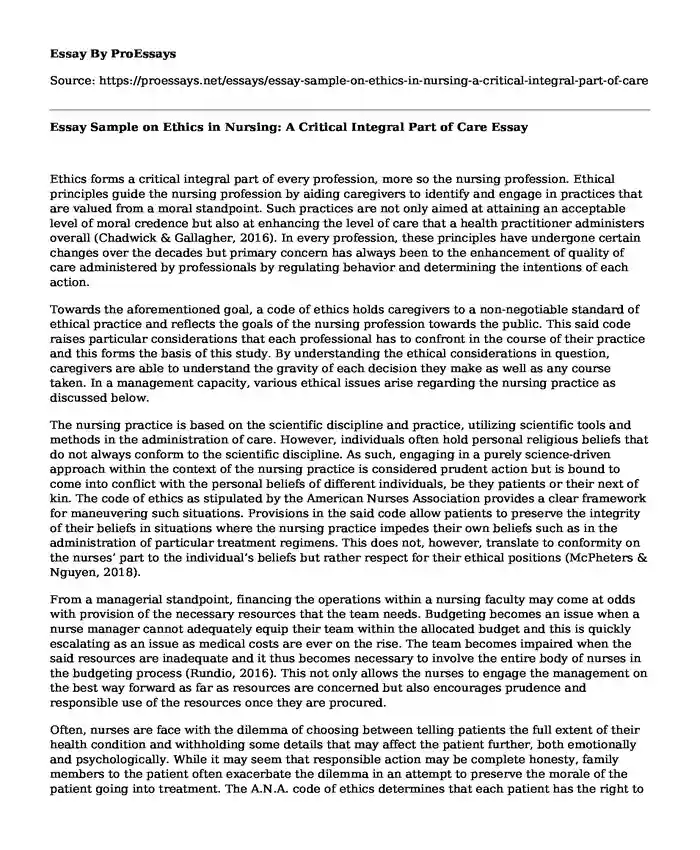Ethics forms a critical integral part of every profession, more so the nursing profession. Ethical principles guide the nursing profession by aiding caregivers to identify and engage in practices that are valued from a moral standpoint. Such practices are not only aimed at attaining an acceptable level of moral credence but also at enhancing the level of care that a health practitioner administers overall (Chadwick & Gallagher, 2016). In every profession, these principles have undergone certain changes over the decades but primary concern has always been to the enhancement of quality of care administered by professionals by regulating behavior and determining the intentions of each action.
Towards the aforementioned goal, a code of ethics holds caregivers to a non-negotiable standard of ethical practice and reflects the goals of the nursing profession towards the public. This said code raises particular considerations that each professional has to confront in the course of their practice and this forms the basis of this study. By understanding the ethical considerations in question, caregivers are able to understand the gravity of each decision they make as well as any course taken. In a management capacity, various ethical issues arise regarding the nursing practice as discussed below.
The nursing practice is based on the scientific discipline and practice, utilizing scientific tools and methods in the administration of care. However, individuals often hold personal religious beliefs that do not always conform to the scientific discipline. As such, engaging in a purely science-driven approach within the context of the nursing practice is considered prudent action but is bound to come into conflict with the personal beliefs of different individuals, be they patients or their next of kin. The code of ethics as stipulated by the American Nurses Association provides a clear framework for maneuvering such situations. Provisions in the said code allow patients to preserve the integrity of their beliefs in situations where the nursing practice impedes their own beliefs such as in the administration of particular treatment regimens. This does not, however, translate to conformity on the nurses’ part to the individual’s beliefs but rather respect for their ethical positions (McPheters & Nguyen, 2018).
From a managerial standpoint, financing the operations within a nursing faculty may come at odds with provision of the necessary resources that the team needs. Budgeting becomes an issue when a nurse manager cannot adequately equip their team within the allocated budget and this is quickly escalating as an issue as medical costs are ever on the rise. The team becomes impaired when the said resources are inadequate and it thus becomes necessary to involve the entire body of nurses in the budgeting process (Rundio, 2016). This not only allows the nurses to engage the management on the best way forward as far as resources are concerned but also encourages prudence and responsible use of the resources once they are procured.
Often, nurses are face with the dilemma of choosing between telling patients the full extent of their health condition and withholding some details that may affect the patient further, both emotionally and psychologically. While it may seem that responsible action may be complete honesty, family members to the patient often exacerbate the dilemma in an attempt to preserve the morale of the patient going into treatment. The A.N.A. code of ethics determines that each patient has the right to the full truth about their health and it is thus the nurses’ responsibility to be honest and truthful to the patients (Olson & Stokes, 2016). Family members should thus be encouraged to offer support to the patient even when the truth can be burdensome to them.
Conclusion
Ethics work to guide the nursing profession to adhere to a moral standard that reflects the goals of the profession towards the community they serve. Nurse managers often encounter such moral dilemmas that require application of these ethical standards in order to ensure effective administration of care. The code of ethics for the nursing profession provides a stable framework for responding to such dilemmas and determines the course of action in situations such as the ones discussed above.
References
Chadwick, R., & Gallagher, A. (2016). Ethics and nursing practice. Macmillan International Higher Education.
McPhetres, J., & Nguyen, T. V. T. (2018). Using findings from the cognitive science of religion to understand current conflicts between religious and scientific ideologies. Religion, Brain & Behavior, 8(4), 394-405.
Olson, L. L., & Stokes, F. (2016). The ANA code of ethics for nurses with interpretive statements: Resource for nursing regulation. Journal of Nursing Regulation, 7(2), 9-20.
Rundio, A. (2016). The nurse manager’s guide to budgeting & finance. Sigma Theta Tau.
Cite this page
Essay Sample on Ethics in Nursing: A Critical Integral Part of Care. (2023, Sep 25). Retrieved from https://proessays.net/essays/essay-sample-on-ethics-in-nursing-a-critical-integral-part-of-care
If you are the original author of this essay and no longer wish to have it published on the ProEssays website, please click below to request its removal:
- Brief Synopsis of the Article on Patient-Centered Care
- The Benefits of a New RN Residence Program Paper Example
- Oncology Nurses: Providing Physical & Psychological Care for Cancer Patients - Essay Sample
- Essay Sample on Advanced Practice Nursing: Education Requirements and Benefits
- Essay Example on My Professional Journey: A Nurse's Ambition to Grow and Succeed
- Essay Example on Four IOM Reports Messages: Significance for Nursing
- Essay Example on Caring for Traumatic Brain Injuries: Understanding Severity and Characteristics







